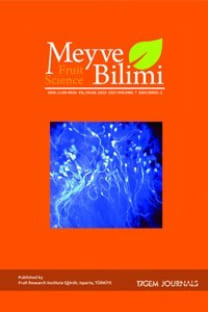Yerli Kayısı Çeşit ve Tiplerinin Kendine Verimlilik Durumlarının Moleküler Yöntemlerle Belirlenmesi
Prunus armeniaca, S-genotip, SRc-R, SRc-F, allel
-
Prunus armeniaca, S-genotype, SRc-R, SRc-F, allel,
___
- Kaynaklar
- Bassi, D., Bartolini, S., Viti, R., 2006. Recent Advances on Enviromental and Physiological Challanges in Apricot Growing. Acta Horticulturae 717: 23-32.
- Chen, X., Wu, Y., Chen, M., He, T., Feng, J., Liang, Q., Liu, W., Yang, H., Zhang, L., 2006. Inheritence and Correlation of Self-compatibility and Other Yield Components in the Apricot Hybrid F1 Populations. Euphytica 150: 69-74.
- Faust, M., 1989. Physiology of Temperate Zone Fruit Trees. John Willey&Sons, New York.
- Gulcan, R., Misirli, A., Saglam, H., Yorgancioglu, U., Erkan, S., Gumus, M., Olmez, H.A., Derin, K., Paydas, S., Eti, S., Demir, T., 2006. Properties of Turkish Apricot Land Races. Acta Horticulturae 701: 191-198.
- Halasz, J., Pedryc, A., Ercisli, S., Yilmaz, K.U., Hegedus, A., 2010. S-genotyping Supports the Genetic Relationships between Turkish and Hungarian Apricot Germplasm. Journal of the American Society for Horticultural Science 135(5): 410-417.
- Jie, Q., Shupeng, G., Jixiang, Z., Manru, G., Huairui,S., 2005. Identification of Self-Incompatibility Genotypes of Apricot (Prunus armeniaca L.) by S-allel-specific PCR Analysis. Biotechnology Letters 27: 1205-1209.
- Paydas, S., Eti, S., Gulcan, R., Derin, K., Yilmaz, K.U., 2006. In Vıtro Investigations on Pollen Quality, Production and self Incompatibility of Some Apricot Varieties in Malatya-Turkey. Acta Horticulturae 701: 75-80.
- Romero,C., Vilanova, S., Burgos, L., Martinez-Calvo, J., Vicente, M., Llacer, G., Badanes, M.L., 2004. Analysisi of the S-Locus Structure in Prunus armeniaca L. Identification of S-haplotype S-RNase and F-box Genes. Plant Molecular Biology 56: 145-157.
- Vilanova, S., Romero, C., Llacer, G., Badanes, M.L., 2005. Identification of Self-(in)compatibility Alleles in Apricot by PCR and Sequences Analysis. Journal of the American Society for Horticultural Science 130(6): 893-898.
- ISSN: 2148-0036
- Başlangıç: 2013
- Yayıncı: Meyvecilik Araştırma Enstitüsü Müdürlüğü
Bazı Turunçgil Anaçlarının ‘Valencia Late’ Portakalında Meyve Kalite Özellikleri Üzerine Etkileri
Talip YİĞİT, Yüksel SARITEPE, Ali Seydi ÖZER, Ahmet ASLAN, Abdullah ERDOĞAN
Bazı Böğürtlen Çeşitlerinde Budamanın Verim ve Meyve Kalite Özellikleri Üzerindeki Etkileri
Kazim GÜNDÜZ, Emine ÖZDEMİR, Sedat SERÇE
Yerli Kayısı Çeşit ve Tiplerinin Kendine Verimlilik Durumlarının Moleküler Yöntemlerle Belirlenmesi
Kadir Uğurtan YILMAZ, Salih KAFKAS, Sevgi PAYDAŞ KARGI
Farklı Malç Tiplerinin Sofralık Kayısılarda Meyve Kalitesi Üzerine Etkileri
Hava Kirliliğinin Asmalar Üzerindeki Etkileri
Gelecek İçin Türkiye Meyve Endüstrisinin Konumlandırılması
Bazı Şelatlı Demir Gübrelerinin Şeftalide Demir Eksikliği Klorozuna Etkileri
